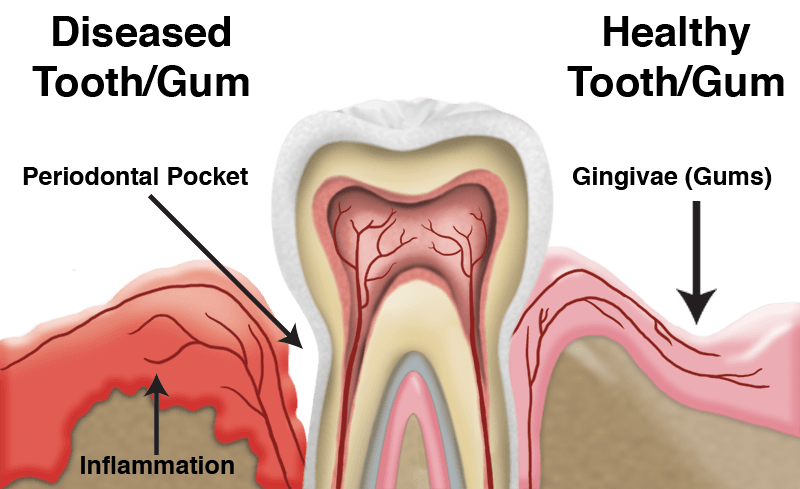Diagnosis and Treatment
DIAGNOSIS AND TREATMENT
Diagnosis And Treatmet
Periodontal disease is diagnosed by your dentist or dental hygienist during a periodontal examination.
A periodontal probe (similar to a tiny ruler) is gently used to measure the space between the tooth and the gums and helps determine the depth of the pocket. As periodontal disease progresses, the pockets usually get deeper.
Your dentist or hygienist will use pocket depths, amount of bleeding, inflammation, tooth mobility, etc., to make a diagnosis that will fall into a category below:
Gingivitis
Gingivitis is the first stage of periodontal disease. Plaque and its toxin by-products irritate the gums, making them tender, inflamed, and likely to bleed.

Periodontitis to Advanced Periodontitis
As calculus and plaque continue to build up, the gums begin to recede from the teeth. Deeper pockets form between the gums and teeth and the gums become very irritated, inflamed, and bleed easily. Slight to moderate bone loss may be present and left untreated, over time, the teeth lose support and can be lost.
Treatment
All treatment methods depend upon the type and severity of disease.
If caught in the early stages of gingivitis, and no damage has occurred, one to two cleanings may be recommended. Detailed oral hygiene instruction will be given to help you be successful at home to clean and maintain the condition of your gum health.
If the periodontal disease has progressed to more advanced stages, a special periodontal cleaning will be recommended called scaling and root planning. This is sometimes referred to as a deep cleaning. During this procedure plaque, calculus, and bacteria are removed from below the gums. Generally, our patients find minimal discomfort.
We also work very closely with local Periodontist's to make appropriate referrals when needed.
Again, detailed oral hygiene instruction will be given to help your be successful at home to clean and maintain the condition of your gum health
Once your periodontal therapy has been completed, the dentist and dental hygienist will recommend that you have regular maintenance cleanings, usually every three to four months. Good oral hygiene practices and periodontal cleanings are essential in maintaining dental health and keeping periodontal disease under control!
Do you have any concerns or need a Periodontal evaluation?
© 2024
All Rights Reserved | Dr. Frederick Klee

